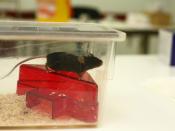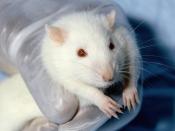Animal experimentation has been an extremely controversial subject for years. Whether or not it is moral vs. whether or not it is essential is explained throughout the pros and cons. Although animal experimentation is the most common, there are many other different methods to scientific experimentation. The various methods other than animals include invitro methods, cell methods, computer model methods, and even human studies. Many questions arise on the topic of alternative methods that completely eliminate the use of animals. It has been proven that all of these methods combined at least limit the need for animals but do not completely eliminate it. Unfortunately, these types of testing only reduce the stress to the animal, or reduce the number of animals required, while maintaining the quality of the information obtained (Goldberg). What the future holds for animal testing is unknown but studies have shown that "over the past 20 years, the number of animals used in medical research has declined from 20 percent to about 50 percent" (Weakly Reader Publication).
The history of animal experimentation shows that there is hope for better alternatives to animal testing that will one day, completely eliminate it.
"Animals have been used in research for more than 2000 years" (Day). Galen, born in 131 A.D, is considered to be the founder of experimental physiology because he used animals to prove that veins carry blood and not air. He had many mistakes though, since human dissection was prohibited at the time. So in 1543 Vesalius corrected his mistakes by publishing his Structure of the Human Body which was based on human dissections (Day). Ever since the beginning of animal experimentation, opposition to it has grown over time. A philosopher named Jeremy Bentham opposed animal experimentation with one of his famous quotes, "The question is not, can...


